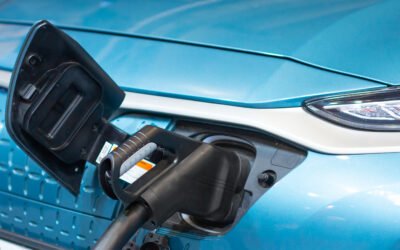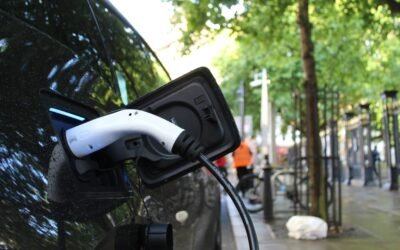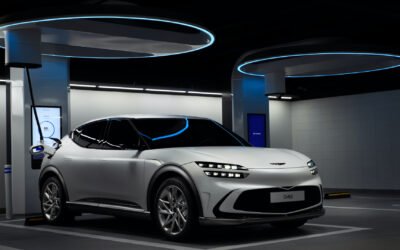• Tesla has introduced a NACS connector for electric vehicle charging.
• With the introduction of the NACS connector and the existing Tesla Superchargers network, Tesla is expected to enable widespread adoption of EVs in the market.
• Many automobile OEMs are collaborating with Tesla to manufacture and use their NACS connector for charging.
Tesla, a prominent electric vehicle (EV) manufacturer, is expected to gain additional traction in the EV market of North America through its unique EV charging plug with NACS connector, which will provide access to Tesla’s superchargers to EVs from other manufacturers as well. The collaboration between Tesla and other companies will simplify EV usage, contributing to the widespread adoption of electric vehicles. This article discusses the advantages of Tesla’s charging plug design and its substantial impact on the EV market’s growth.
Are Tesla’s Chargers Better?
Tesla’s first charging connectors were built on the SAE J1772 standard, used by many other electric vehicle manufacturers. These chargers were only compatible with the electric vehicle of a specific manufacturing company. This hindered the efficient deployment of the electric vehicle network on the road. Tesla identified this issue and made its own Tesla Model S Connector. The Tesla Model S connector is a high-power connector that can transmit up to 145 kW of power. This is a lot more power than what the SAE J1772 standard allows. Tesla’s connector is different as it has no separate connector design for AC and DC charging. Both types of charging are possible using the same connector. The charger can provide high power, up to 50kW to 150kW+ through DC charging, which speeds up the charging process.

Figure 1: Several Types of EV Charging Plugs Used in Various Parts of the World
Source: EV Charging Connector Types Guide – Versinetic
In November 2022, Tesla made the EV connector and charge port public. Moreover, they claimed it allowed AC charging and up to 1 MW of DC charging in a small package. It has no moving parts and is half the size and twice as strong as a CCS connector. There are five pins on the NACS. The two main pins are used for AC and DC fast charging. The other three pins do the same things as the SAE J1772 link. Apart from the high charging speed of the connector, the deployment of Tesla’s charging network, especially the fast charging network, gives it an edge over other automobile OEMs. Currently, there are around 12000 Tesla charging stations in the US and 45000 Tesla charging stations worldwide.
Impact of Tesla on the Growth of the EV Market
With the NACS getting public and a network of superchargers in place, Tesla is gaining additional prominence in the EV industry. It is expected that Tesla’s charging standard will become the official charging standard, at least in the US. Similar claims can’t be made regarding the European market, as there Tesla never really had the influence it has in the US. Different automobile OEMs like GM and Ford have already agreed to provide adapters to their EV owners from 2024 so that they can charge on Tesla superchargers. As vehicles from other automobile OEMs gain access to Tesla’s fast charging network from 2024 onwards, it is expected that the penetration of EVs in the US market will at least grow in the coming years.

Figure 2: Growth of Tesla Superchargers Across Different Geographies Over the Period of 10 Years.
Source: supercharge.info
Way Forward
Many automobile OEMs have moved to adopt the NACS, which will provide them access to the supercharging network of Tesla. EVs already produced will require adapters to gain access to Tesla’s EV charging network. In contrast, EVs manufactured by OEMs that have an arrangement with Tesla in the future will be able to directly access the superchargers. As EVs from other automobile OEMs gain access to Tesla’s supercharging network, PTR expects that the adoption of EVs in the US will improve. However, it is noteworthy that the success of NACS will depend on how the interoperability challenges expected to arise are dealt with.
EV Charging Infrastructure Service Overview
The research presented in this article is from PTR's EV Charging Infrastructure market research. For information about this service please submit a request shown below.
Contact Sales:
Europe
+49-89-12250950
Americas
+1 408-604-0522
Japan
+81-80-7808-1378
GCC/Rest of APAC
+971-58-1602441
More about our:
EV Charging Infrastructure Market Research
Recent Insights
European Electric Vehicle Charging Infrastructure (EVCI) Services Market Landscape
This infographic gives an overview of the electric vehicle charging infrastructure (EVCI) services market in the European region. It highlights the...
Exploring the European EVCI Services Market Key Players and Emerging Trends
There has been a significant surge in the development of EVCI due to the widespread adoption of EVs in Europe. By 2030, it is expected that Europe...
Global EV Market: Analysis of EV Sales Slowdown in 2023
• EV sales were impacted adversely in 2023 on account of various factors, including price disparity, consumer perception and supply chain...


